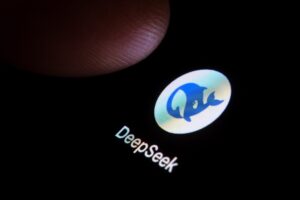US House Committee Declares China’s DeepSeek a Significant Threat

US Congressional Committee Raises Alarms Over DeepSeek AI
A recent report from a US congressional committee has expressed serious concerns regarding the Chinese artificial intelligence tool known as DeepSeek. This AI application has been labeled a "profound threat" to national security by the House Select Committee on the Strategic Competition between the United States and the Chinese Communist Party. The warning comes at a time when relations between the US and China are strained due to escalating trade tensions.
DeepSeek’s Ties to the Chinese Communist Party
The committee’s investigation outlines that DeepSeek has significant connections to the Chinese government, suggesting it is designed to undermine US technological dominance and critical national security policies. According to the report, DeepSeek functions not just as an AI tool but has deeper implications tied to China’s military and research strategy, specifically pointing to associations with institutions like the Zhejiang Lab, which is pivotal for China’s advancements in science and technology.
Security Risks and Data Collection
The report details troubling aspects of DeepSeek’s operation. It claims that while the tool appears to be a standard AI chatbot, it actually has capabilities that pose security risks for its users. The application allegedly collects data from its American users and channels this information back to the People’s Republic of China (PRC). Studies from Feroot Security highlight that DeepSeek utilizes backend systems linked to China Mobile, enabling it to funnel user data effectively. Furthermore, it is said to integrate tracking methods from prominent Chinese tech firms like ByteDance and Tencent.
Growing Popularity and Market Dynamics
DeepSeek has reportedly gained international attention and popularity for its low-cost model. It recently surpassed ChatGPT as the leading free application on Apple’s App Store, reflecting its rapid rise in user adoption. This surge occurs amid increased tariffs both countries have imposed on one another, as the US recently initiated a steep 245 percent tariff on Chinese goods, while Beijing retaliated with a 125 percent tariff on US exports.
Calls for Transparency from Nvidia
In light of these developments, the House Committee has urged Nvidia, a major US chip manufacturer, to disclose information about its customers and collaborations with the Chinese technology sector. This call for transparency coincides with a surprise visit by Nvidia’s CEO Jensen Huang to Beijing, where he met with Chinese officials. The visit is notable since the US government has recently mandated licensing requirements for exports of certain Nvidia chips to China, highlighting the sensitive nature of technology exchange between the two nations.
International Concerns and Restrictions
Due to potential risks of data leaks associated with DeepSeek, several countries, including India, have placed restrictions on government officials using the application. The Chinese government criticized these measures, arguing that they represent the politicization of trade and technology. The US committee references state-owned companies like China Mobile and ByteDance as linked to military and surveillance activities, further emphasizing concerns over DeepSeek’s implications.
Implications of Unchecked Data Practices
The committee’s report warns that DeepSeek’s direct connections to China’s surveillance and security infrastructure, combined with its extensive data collection practices, could enable it to function as an intelligence asset. The potential for DeepSeek to feed American user data into a system regarded as adversarial raises significant alarms. The report articulates that millions of Americans may unknowingly be utilizing an AI tool connected to the CCP, thereby not only facing misinformation but also experiencing the ramifications of Chinese censorship practices that extend beyond their borders.
The ongoing scrutiny of DeepSeek and its implications underscores the broader geopolitical tensions between the US and China, especially as technology increasingly plays a central role in national security.



